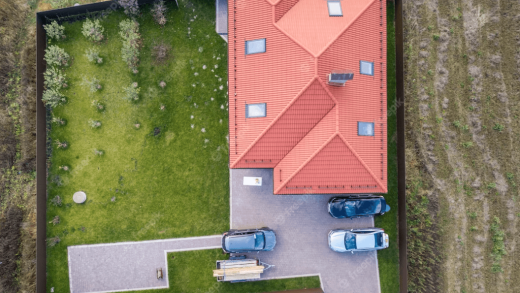What it Takes to Get Licensed as a Roofing Contractor in New York
Are you a skilled roofer looking to take your career to the next level? Or perhaps you’re an aspiring roofing contractor seeking guidance on how to get licensed in New York? Either way, you’ve come to the right place! 
Obtaining a roofing contractor license is not only essential for legal compliance but also a great way to boost your professional credibility and advance your roofing career. In this blog post, we’ll guide you through the licensing process step by step, from meeting educational requirements and passing exams, all the way through maintaining and renewing your license. So buckle up and let’s dive into what it takes to become a licensed roofing contractor in New York!
The Importance of Licensure in Roofing
Licensure is a vital aspect of any professional career, and the roofing industry is no exception. Roofing contractors who are licensed have completed the necessary requirements and qualifications to provide quality services that meet state regulations.
Having a license ensures that you possess the proper knowledge, skillset, and experience to perform roofing tasks safely. Licensing also protects homeowners from unscrupulous individuals posing as professionals who lack the required training or certifications. Working with an unlicensed contractor puts clients at risk of substandard workmanship, liability issues, and potential property damage.
Moreover, obtaining a license demonstrates your commitment to professionalism in your career as a roofing contractor. It shows that you value ongoing education and training to keep up with changing technology and techniques in the industry. A licensed roofer has access to resources such as networking opportunities with other professionals in their field.
Obtaining licensure is crucial for anyone pursuing a successful career in roofing contracting. A license not only provides credibility but also ensures safety measures for both contractors and clients alike while promoting growth within this ever-evolving industry.
Understanding New York’s Licensing Requirements for Roofing Contractors
If you’re considering a career in roofing or already working in the industry, understanding New York’s licensing requirements for roofing contractors is essential. Each state has its own regulations and requirements for obtaining a license to work as a contractor, so it’s important to know what New York requires before beginning the process.
To become licensed as a roofing contractor in New York, you must meet certain educational and experience requirements. You’ll need either an associate degree or higher in architecture, engineering, or construction technology from an accredited institution OR have at least three years of practical experience related to construction.
In addition to meeting educational and experience requirements, prospective roofing contractors must also pass an examination covering relevant topics such as safety practices, building codes, and materials used in roof installation. After passing this exam, applicants can apply for their license through the Department of State Division of Licensing Services.
It’s worth noting that there are different types of licenses available depending on the scope of work you plan to do. For example, if you only want to install shingles or other basic materials on residential properties under $200K value, then your license might be limited but still helpful!
It’s crucial that aspiring contractors take time learning about their state’s specific licensing guidelines because these rules vary greatly across states!
Step-by-Step Guide to Becoming a Licensed Roofing Contractor
Becoming a licensed roofing contractor in New York requires meeting certain educational and experience requirements, passing an examination, and applying for the license. Here’s a step-by-step guide to becoming licensed:
- Firstly, ensure that you meet the educational and experience requirements set by New York state regulations. You must have at least three years of roofing experience as well as proof of completing 144 hours of approved classroom instruction.
- Next, register for and pass the required Roofing Examination administered by the Department of State. The exam covers various topics related to roofing, including safety practices, materials handling procedures, and installation techniques.
- After successfully passing the examination, apply for your license with all necessary supporting documents such as proof of education or certification from manufacturers or professional organizations.
- Once your application is submitted and processed, you will receive notification regarding any additional steps needed before approval can be granted.
- After receiving your license, it is important to maintain it through renewal every two years, which involves continuing education credits relevant to roofing practices to stay up-to-date on industry changes.
Following these steps will help ensure that you are properly licensed as a qualified professional in this growing field!
Meeting the Educational and Experience Requirements
Meeting the educational and experience requirements is an essential step towards becoming a licensed roofing contractor in New York. To qualify for licensure, individuals must meet specific educational and work experience criteria set by the state.
The first requirement is obtaining a high school diploma or equivalent, followed by gaining practical roofing experience under the supervision of a licensed contractor. This means that aspiring contractors should work as apprentices or assistants to established contractors to gain hands-on skills and knowledge.
Additionally, applicants must complete at least 144 hours of classroom instruction on topics related to roofing, such as safety regulations, materials handling, and installation techniques. These courses may be offered through trade schools or vocational training centers recognized by New York State.
It’s important to note that individuals with prior military service can use their relevant training towards some of these educational requirements. By meeting both the education and work experience criteria, aspiring contractors will have better chances of passing the required exams and being granted their license.
In summary, meeting both education and work experience criteria are crucial steps towards acquiring a license. It helps ensure that qualified professionals are providing quality services while also reducing any potential risks associated with substandard practices in roofing contracting.
Passing the Roofing Examination
Passing the roofing examination is a crucial step towards becoming a licensed roofing contractor in New York. The exam measures your knowledge of the industry, including safety regulations, building codes, and best practices for installing or repairing roofs.
To prepare for the exam, it’s essential to study topics such as roof design and construction methods, waterproofing techniques, materials selection, and installation processes. You can also enroll in courses offered by professional organizations or trade schools to further develop your skills.
The roofing exam typically consists of two parts: written and practical. The written portion covers theoretical concepts that you learn during training, while the practical part evaluates your ability to apply these concepts on a job site.
When taking the test, ensure that you read all instructions carefully before answering each question. Answer only what is asked without adding unnecessary information or deviating from the topic at hand.
Remember that passing this exam proves that you have gained enough knowledge about roofing to work safely and effectively in this field. It will help build trust with potential clients as they know that their property will be handled professionally by someone who has proven their expertise through licensing exams.
Applying for the License
Once you have met New York’s educational and experience requirements, as well as passed the roofing examination, it is time to apply for your license. The application process begins with completing an application form and submitting it along with all required documentation.
The first step in applying for a roofing contractor license is to gather all necessary documents. This includes proof of education and experience, a passing score on the examination, and any other related certifications or licenses held.
After gathering all necessary documents, double-check them for accuracy before submitting them with the application form. Any errors or missing information could delay the processing of your application.
It is important to note that there are fees associated with applying for a roofing contractor license in New York. These fees can vary depending on factors such as location and type of license being applied for.
Once you have submitted your completed application form and supporting documentation, be sure to keep track of its status. You may need to follow up or provide additional information if requested by licensing authorities.
While applying for a roofing contractor license can seem daunting at first glance, following these steps will help ensure a successful outcome.
Maintaining and Renewing Your License
Once you have obtained your roofing contractor license in New York, it is essential to maintain and renew your license regularly. This ensures that you remain up-to-date with any changes in state regulations and continue to meet the requirements for being a licensed professional.
To maintain your license, you will need to complete continuing education courses related to roofing or construction. The number of hours required may vary depending on the state’s regulations. It’s also important to keep track of when your license needs to be renewed, as failure to do so can result in penalties or suspension of your ability to work as a contractor.
Renewal typically involves submitting an application along with any necessary fees and documentation, such as proof of insurance coverage. Some states may require additional testing or background checks before allowing you to renew your roofing contractor license.
By maintaining and renewing your roofing contractor license, not only are you complying with legal requirements but also demonstrating professionalism and commitment towards providing quality services for clients.
Benefits of Becoming a Licensed Roofing Contractor
Becoming a licensed roofing contractor in New York is more than just attaining the legal right to work. It comes with a host of benefits that can help you grow your business, expand your knowledge, and improve your reputation in the industry.
Firstly, being licensed gives you credibility as a professional. Clients are more likely to trust and hire contractors who have gone through the licensing process because it proves that they have met certain standards of education, experience, and skill. This can lead to increased job opportunities and higher-paying projects.
Another benefit is access to ongoing training and resources. Many states require license holders to complete continuing education courses or participate in other forms of professional development. These programs provide valuable insights into new technologies, techniques, safety practices, and regulations that can help you stay competitive.
Additionally, having a license often means that you are eligible for better insurance rates. Insurance companies view licensed contractors as less risky than those without licenses because they have demonstrated their expertise and commitment to following state regulations.
Becoming a licensed roofing contractor shows that you take pride in your profession and are willing to invest time and effort into improving yourself as well as contributing positively towards maintaining high-quality standards across the industry.
The Role of Insurance in Roofing Licensure
When it comes to roofing licensure, insurance plays a vital role. In fact, in many states including New York, having adequate insurance coverage is a requirement for obtaining and maintaining a roofing license.
General liability insurance is one of the most important types of coverage for roofing contractors. This type of insurance protects your business from claims related to bodily injury or property damage that may occur while you’re working on a job site.
Workers’ compensation insurance is also essential for protecting your employees if they get injured on the job. In New York, this type of coverage is mandatory, and failing to have it can result in stiff penalties and fines.
Additionally, some clients may require you to carry specific types or amounts of insurance as part of their contract requirements. This makes having sufficient coverage not only necessary but also beneficial for securing more lucrative jobs.
Having proper insurance coverage can help mitigate risks associated with running a roofing business while simultaneously improving credibility and trustworthiness among potential customers.
Tips for Preparing for the Roofing Examination
Preparing for the roofing examination can be a daunting task, but with proper planning and studying techniques, you can increase your chances of passing. Here are some tips to help you prepare:
- Familiarize yourself with the exam format: Understanding the structure and content of the exam will help you focus your studies on relevant topics.
- Create a study plan: Make a schedule that includes regular study sessions leading up to the exam date.
- Use practice exams: Practice makes perfect! Utilize practice tests to help identify areas where you may need more study time.
- Study in short bursts: Rather than cramming all at once, it’s better to break up your studying into shorter sessions over a longer period of time.
- Review your notes regularly: Keep track of any important information or formulas from class and review them regularly leading up to the test.
- Seek out additional resources if needed: If there are specific sections that are particularly challenging, don’t hesitate to seek out additional resources such as textbooks or online tutorials.
By following these tips, you’ll be well-prepared when it comes time for your roofing examination!
Networking and Professional Development for Licensed Contractors
Networking and professional development are crucial aspects for any licensed roofing contractor looking to advance their career. One of the best ways to network is by attending industry events, conferences, and trade shows. These gatherings offer opportunities to connect with other professionals in the field, learn about new products and technologies, and gain valuable insights into industry trends.
Another great way to expand your professional network is by joining a local or national association for roofing contractors. Membership offers access to networking events, educational resources, and support from like-minded professionals who share your commitment to excellence in the industry.
In addition to networking opportunities, continuing education courses can help licensed contractors stay up-to-date on regulations, safety standards, and best practices. Many states require continuing education as part of license renewal processes. Taking courses through accredited providers also demonstrates a commitment to ongoing learning that can set you apart from competitors.
Participating in mentorship programs or seeking out experienced mentors within the industry can provide invaluable guidance for navigating challenges faced by even seasoned contractors. Whether it’s advice on project management techniques or marketing strategies for growing your business – having someone who has been there before can make all the difference in advancing your career as a licensed roofing contractor.
Understanding the Consequences of Working Without a License
Working without a roofing contractor license in New York can have serious consequences. It is considered illegal in the state, and violators may face fines and legal action.
Not having a license means that you cannot legally operate as a professional roofing contractor. This puts you at risk of being sued by clients or facing complaints from them to consumer protection agencies for performing substandard work or not completing projects on time.
Furthermore, working without a license risks your safety as well as the safety of others around the job site. Unlicensed contractors are less likely to follow proper safety standards and could put themselves, their employees, and even nearby residents in danger.
Additionally, unlicensed contractors often lack insurance coverage, which protects both workers and clients against accidents or damage caused during construction work. Without insurance coverage, all costs for damages will be borne solely by the homeowner if something goes wrong with the project.
It’s essential to obtain a valid roofing contractor’s license before starting any business operations in New York State. Working without one is simply not worth risking penalties imposed by law enforcement authorities or putting yourself at risk of financial loss due to litigation arising out of poor quality roof installations.
Conclusion
Becoming a licensed roofing contractor in New York is a rigorous process that requires dedication, education, and experience. It involves meeting the state’s educational and experience requirements, passing an examination, applying for the license, and maintaining it by fulfilling all obligations to keep it current.
But once you have accomplished these steps and earned your license as a roofing contractor in New York State, you’ll gain many benefits like credibility with clients seeking quality workmanship from reputable contractors. You will be able to network with other professionals in the industry and take advantage of professional development opportunities that can help increase your skills and knowledge base.
It’s important to note that working without proper licensure can have serious consequences such as fines or even legal action against those who engage in this activity. So if you are considering entering into the field of roofing or looking to advance your career as a licensed contractor – make sure that everything is done right from start to finish!
Getting licensed as a roofing contractor may seem daunting at first glance, but it’s worth all the effort when you consider how much more credible you become within your community versus unlicensed operators who cut corners just because they want quick money without any concern for their reputation or their clients’ needs!



